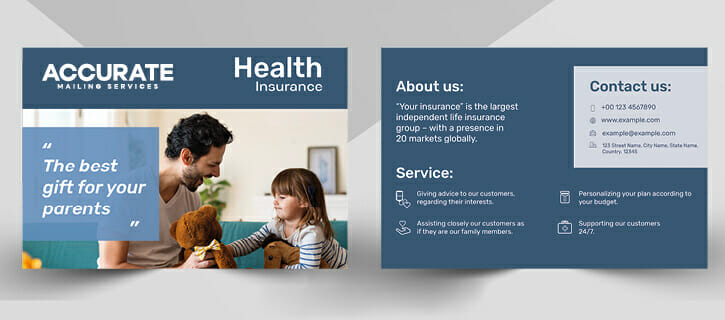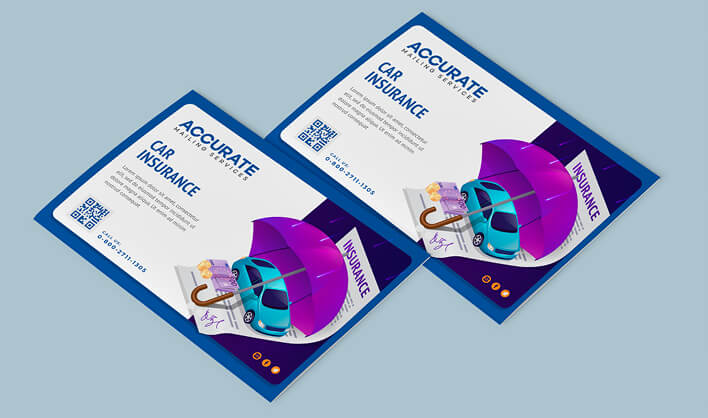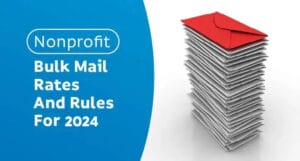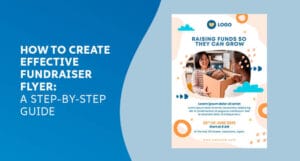Listen to this blog summary:
Direct mail marketing continues to stand out in the fast-paced world of insurance marketing, where digital tactics often take the lead. Insurance Direct mail marketing is still an effective way for insurance agents to get more leads and connect with possible clients on a more personal level. This guide will teach insurance agents everything they need to know about direct mail marketing, from its main strategies to how it might affect lead creation.

What is Direct Mail Marketing for Insurance Agents?
Direct mail marketing for insurance agents involves sending physical promotional materials, such as letters, brochures, postcards, and flyers, directly to potential clients’ mailboxes. This approach aims to engage recipients, educate them about insurance services, and encourage them to take specific action, such as contacting the agent for more information, requesting a quote, or signing up for a policy.
Direct mail marketing aims to create a personalized and tangible connection with potential clients, effectively conveying the benefits of insurance services and building brand awareness. This method can be effective when combined with targeted audience selection and compelling content that addresses the recipients’ needs and concerns.
The Power of Direct Mail in Insurance Marketing:
Insurance agencies have endless possibilities when sending important stuff. You can send various types of materials through direct mail marketing as an effective way for insurance companies to communicate with your prospects. Direct mail is a tangible and personalized approach that helps insurance companies establish a strong connection with their audience. Here’s how you can use direct mail for each type of material:
- Proposal Forms: Using our Variable Data Printing services, you can send customized proposal forms to potential clients, showcasing different insurance options tailored to their needs and preferences. It provides a physical invitation to explore insurance offerings.
- Policy Forms: Provide clients with a detailed policy document that outlines coverage details, acting as a roadmap for their insurance coverage.
- Cover Notes: Send concise cover notes as a quick summary of what’s included in a policy, offering a convenient overview.
- Certificates of Insurance: Issue official certificates of insurance through direct mail to prove that individuals have active coverage, similar to an insurance ID card.
- Endorsements: Communicate policy adjustments and additions via direct mail to ensure coverage aligns perfectly with clients’ requirements.
- Account Information: Share the nitty-gritty details of a client’s policy through direct mail, providing a comprehensive view of their insurance account.
- Remittance Advice: Send receipts confirming payment receipt through direct mail, offering peace of mind and financial confirmation.
- Checks: Deliver paper checks for payments via direct mail to facilitate the payment process and maintain a traditional payment option.
- Renewal Notices: Use direct mail to remind clients when it’s time to renew their policies, providing a friendly nudge and a clear call to action.
- Account Statements: Send detailed account statements through direct mail, summarizing payments and coverage like a financial report card.
- Order Receipts: Confirm orders and transactions via direct mail, offering a tangible confirmation of successful transactions.
- Marketing Mail: Utilize creative direct mail marketing to showcase insurance benefits, giving recipients a sneak peek into the insurance world and how it can benefit them.
- Thank You Messages: Express gratitude to clients through direct mail by sending customized postcards and showing appreciation for their trust and business.
- Referral Offers: Encourage clients to refer others through direct mail with referral incentives, rewarding them for spreading the word about your insurance services.
- T&C Change Notifications: Alert clients about changes in terms and conditions through direct mail, keeping them informed and maintaining transparency.
Direct mail for insurance agents allows companies to share vital information and maintain a personalized connection with clients, enhancing customer engagement and satisfaction. It offers a tangible and impactful way to communicate various aspects of insurance policies and services, fostering client trust and loyalty.

Crafting a Strategy for Insurance Direct Mail Marketing:
A Direct Mail Marketing Strategy for Insurance agencies is a targeted plan that utilizes direct mail to reach potential clients and promote insurance services effectively. This strategy is designed to engage recipients, collect insurance leads, educate them about insurance options, and prompt them to take specific actions, such as requesting a quote, scheduling a consultation, or signing up for a policy. Here’s a breakdown of the key components of a direct mail marketing strategy for insurance agencies:
- Define Your Objectives: Determine your goals, such as lead generation, policy sales, or brand awareness. Understanding your objectives is the first step in creating an effective strategy.
- Identify Your Target Audience: Clearly define your ideal clients based on demographics, location, income, and insurance needs. This ensures your message resonates with the right people and collects the direct mail insurance leads.
- Craft Compelling Content: Develop personalized and persuasive content that addresses your target audience’s pain points and needs. Highlight the benefits of your insurance services.
- Create a Strong Call to Action (CTA): Include a clear and compelling CTA that guides recipients on what action to take next. Whether it’s calling for a quote or visiting your website, the CTA should be easy to follow.
- Design Professional Materials: Use a clean and visually appealing design incorporating your branding elements, such as logos and colors. Ensure that the content is easy to read and understand.
- Personalize Your Messages: Add personalization elements like the recipient’s name and customized content to create a more personalized connection.
- Include Tracking Mechanisms: Incorporate unique codes, QR codes, specific URLs, or contact information to track responses and measure the success of your campaigns.
- Segment Your Mailing List: Divide your mailing list into segments such as demographics or insurance needs. This allows for tailored messaging for each group.
- Quality Printing and Mailing: Invest in high-quality printing and partner with Accurate Mailing Services to ensure your materials are delivered promptly and professionally.
- Timing Matters: Send your direct mail at a time when recipients are most likely to pay attention. Avoid mailing during holidays or peak vacation seasons.
- Follow Up Promptly: Be prepared to respond quickly to inquiries or responses from your direct mail. Timely follow-up demonstrates your commitment to potential clients.
- Nurture Leads: Not all leads will convert immediately. Establish a system to nurture leads through additional direct mail or other communication channels over time.
A well-executed direct mail marketing strategy for insurance agents allows you to establish a tangible and personalized connection with potential clients, increasing the likelihood of engagement and conversion. It’s an effective tool for building trust and loyalty within the insurance industry.
Insurance Marketing Challenges:
- Digital Noise: There is a lot of noise in the digital space, with many online ads and emails vying for attention. This makes it difficult for insurance agencies to stand out and get their message heard.
- Trust Building: People must trust insurance companies to do business with them. However, trust can be difficult to build, especially in an industry known for its high-pressure sales tactics and complex contracts.
- Personalization: People want to feel like they are being spoken to as individuals, not just as numbers. This can be a challenge for insurance companies, which often have to communicate with large numbers of people.
- Complex Information: Insurance can be a complex product, and it can be difficult to explain in a way that is easy to understand. This can lead to clarity and satisfaction among consumers.
How Direct Mail Can Solve Insurance Marketing Challenges:
- Grabs Attention: Direct mail gets noticed, unlike digital stuff. Postcards and brochures are exciting to receive.
- Builds Trust: When you send something real, it shows you care. People trust companies that take the time to send personal messages.
- Personalized Mail: Direct mail can be personalized to the recipient. Adding the person’s name and custom info makes it feel special. This can help build relationships and trust, leading to more sales.
- Simplifies Info: Direct mail breaks down complex info. With pictures and simple words, it’s easier to understand.

How Accurate Mailing Services Can Help:
Insurance Direct mail marketing isn’t just sending letters. It’s about sending solutions and showing you care. Using this idea, insurance companies can solve the challenges of the digital age and make friends with clients. Accurate Mailing Services specializes in optimizing direct mail campaigns for insurance companies. Here’s how we can assist you:
- Data Accuracy: We ensure the accuracy of your mailing list, preventing wasted resources and maximizing campaign effectiveness.
- Professional Design: Our team can create eye-catching and effective direct mail designs. Our Variable Data Printing services will reflect your brand and message.
- Targeted Reach: We help you target the right audience segments to increase your campaign’s success.
- Cost Efficiency: By streamlining the mailing process and utilizing bulk mailing rates, we help you save on postage and production costs.
- Tracking and Analysis: We provide tracking mechanisms and analytics to measure campaign performance, allowing for data-driven adjustments.
With our services, you can harness the power of direct mail to effectively market your insurance products and services, ultimately growing your business and reaching your marketing goals.
How to Measure the Success of Your Insurance Direct Mail Campaigns:
Measuring the success of your insurance direct mail campaigns provides valuable insights into their effectiveness. According to Lob’s 2023 State of Direct Mail report – The 2023 survey indicated that 74% of marketers believe direct mail has the highest ROI, up from 67% in 2022.
Implement these metrics to assess performance:
- Response Rate: Calculate the percentage of recipients who responded to your mailer, indicating engagement.
- Conversion Rate: Measure the proportion of respondents who took the desired action, such as visiting your website or contacting your agency.
- Return on Investment (ROI): Evaluate your campaign’s financial impact by comparing the campaign’s cost to the revenue generated from converted leads.
The Future of Insurance Direct Mail Marketing
As technology continues to evolve, the future of insurance direct mail marketing is promising. Integration with digital tools, such as personalized URLs and QR codes, enables a seamless transition from direct mail to online interactions. Furthermore, as consumers seek authentic and personalized experiences, the tactile nature of direct mail offers a great opportunity to stand out in an increasingly digital world.
Conclusion:
Insurance marketing is changing, but direct mail is still powerful. Insurance agents can use direct mail to connect with potential clients effectively. Agents can make the most of direct mail by sending personalized messages to the right people and measuring results, even in today’s digital world. In the future, direct mail’s personal touch will continue to be valuable when building real connections. Direct mail can boost your insurance marketing. Learn about our Direct Mailing Services and how we can get you better results and improve your campaigns. Adapt, be creative, and use insurance direct mail marketing to grow your agency in the digital age.



